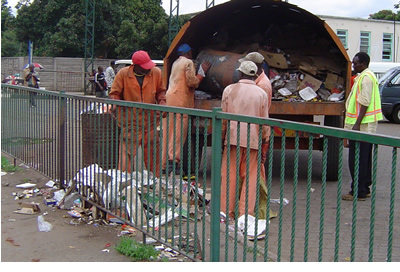Government of national unity looks terminally disunited
Friday, February 19th, 2010 by Bev ClarkFrom The Economist:
A the relative optimism of last year, the situation in Zimbabwe is deteriorating badly. South African-mediated talks between ZANU-PF, the party of President Robert Mugabe, and the Movement for Democratic Change (MDC), led by the prime minister, Morgan Tsvangirai, which are aimed at shoring up their shaky power-sharing pact, have broken down, maybe irretrievably. This leaves the one-year-old “government of national unity” as good as dead. Schools, hospitals, courts and other state services have been brought to a halt by striking civil servants. Meanwhile, all new investment projects have been put on hold following the promulgation of “indigenisation” rules obliging companies worth more than $500,000 to cede a 51% stake to black Zimbabweans—or face up to five years in jail.
Harare, the capital, is abuzz with talk of a snap general election, possibly as early as April. Jacob Zuma, South Africa’s president, is understood to have convinced Mr Tsvangirai to abandon all his demands in his negotiations with Mr Mugabe save those essential for ensuring a fair democratic poll. With ZANU-PF blocking every MDC attempt at reform, Mr Zuma appears to agree that the unity government has become a sham. He is determined that no trouble on South Africa’s northern border should upset his country’s hosting of the football World Cup in June and July.
Some argue that the unity government has made a bit of progress over the past year. They point to the huge improvement in the economic situation, with a 4.7% expansion of GDP last year, the first growth in a decade, as well as the reopening of schools and hospitals. Although all this is true, it has more to do with the replacement of Zimbabwe’s worthless currency by the dollar, which happened before the unity government was set up, than anything the government itself has done.
Apart from the economy, the situation on the ground has barely changed at all, with Mr Mugabe holding on to the reins of real power. White-owned farms continue to be invaded. Human-rights and MDC activists are still being beaten up and arrested. MDC provincial governors have still not been allowed to take up their posts. Mr Mugabe continues to control the security forces. The affable Mr Tsvangirai has borne all the sleights and humiliations with astonishing calm. But even he appears to have run out of patience. The only way forward, he now says, is to agree on a “road map” to a fresh election.
If genuinely free, the MDC would be sure to win this hands down. Polls suggest that support for ZANU-PF, in power for the past 30 years, has shrunk to less than 20%. But there are fears that, without the planned new democratic constitution or independent electoral commission in place, there would be a return to the violence that marked the latest elections—unless the Southern African Development Community, a fairly spineless 15-member regional group, is prepared to take tough measures. Those should include, some argue, sending in troops if necessary.










